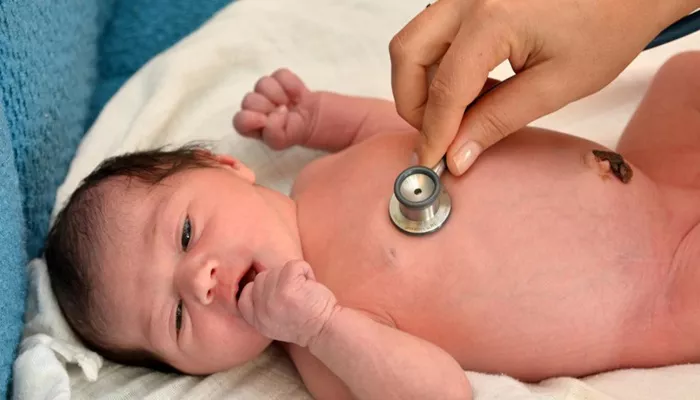Hyperbilirubinemia, commonly known as jaundice, is a condition where there is an excess of bilirubin in the blood. Bilirubin is a yellow compound that occurs in the normal catabolic pathway that breaks down red blood cells in the body. When its levels are too high, it can cause yellowing of the skin and eyes.
Understanding Hyperbilirubinemia
Causes of Hyperbilirubinemia
There are several causes of hyperbilirubinemia in newborns. These include:
Physiological Jaundice: Most common and usually harmless, occurring due to immature liver function.
Breastfeeding Jaundice: Occurs when a newborn is not getting enough breast milk, leading to dehydration and decreased bilirubin elimination.
Breast Milk Jaundice: Caused by substances in breast milk that can increase bilirubin levels.
Hemolytic Disorders: Conditions like ABO or Rh incompatibility where the baby’s blood type is incompatible with the mother’s, leading to rapid breakdown of red blood cells.
Infections: Such as sepsis, which can increase the rate of red blood cell breakdown.
Genetic Disorders: Such as G6PD deficiency, which makes red blood cells more fragile.
Symptoms of Hyperbilirubinemia
The primary symptom of hyperbilirubinemia is the yellowing of the skin and eyes. Other symptoms may include:
Lethargy
Poor feeding
Dark urine
Pale stools
Preventing Hyperbilirubinemia
Early Feeding Practices
Ensuring that a newborn is well-fed is crucial. Adequate feeding helps increase the frequency of bowel movements, which aids in the excretion of bilirubin.
Breastfeed Frequently: Newborns should be breastfed 8-12 times per day during the first few days of life.
Monitor Feeding: Ensure the baby is latching well and getting enough milk. If breastfeeding is challenging, seek help from a lactation consultant.
Supplement if Necessary: If breastfeeding is not sufficient, discuss with a pediatrician about supplementing with formula.
SEE ALSO: What Is a Dangerous Bilirubin Level in Newborns?
Monitoring and Assessment
Regular monitoring and assessment of the newborn’s bilirubin levels are essential.
Early Checkups: Newborns should have their bilirubin levels checked within the first 24 hours of life.
Home Visits: Arrange for home visits by a healthcare professional to assess the baby’s condition.
Follow-Up Appointments: Ensure follow-up appointments with the pediatrician, especially if the baby is at high risk for jaundice.
Phototherapy
Phototherapy is a common treatment for reducing bilirubin levels in newborns.
Hospital-Based Phototherapy: In severe cases, the baby may need to stay in the hospital for phototherapy.
Home Phototherapy: For less severe cases, phototherapy can be administered at home with guidance from a healthcare provider.
Identifying Risk Factors
Understanding and identifying risk factors can help in preventing hyperbilirubinemia.
Blood Type Testing: Mothers should have their blood type tested during pregnancy. If there is a risk of Rh or ABO incompatibility, appropriate measures can be taken.
Genetic Screening: Genetic screening for conditions like G6PD deficiency can help in early identification and management.
Parent Education
Educating parents about hyperbilirubinemia is vital.
Recognize Symptoms: Parents should be taught to recognize the signs of jaundice and know when to seek medical help.
Understand Treatment Options: Parents should be informed about the different treatment options available and the importance of follow-up care.
Breastfeeding Support: Provide parents with resources and support for breastfeeding to ensure the baby is getting enough nutrition.
Hospital Policies and Practices
Hospitals should have policies in place to prevent and manage hyperbilirubinemia.
Routine Screening: Implement routine bilirubin screening for all newborns before discharge.
Early Discharge Follow-Up: Ensure early discharge plans include follow-up bilirubin checks.
Breastfeeding Support: Provide lactation consultants and breastfeeding support to new mothers.
Managing Mild Jaundice at Home
For mild cases of jaundice, certain measures can be taken at home to help reduce bilirubin levels.
Sunlight Exposure: Brief periods of sunlight exposure can help lower bilirubin levels. Ensure that the baby is not exposed to direct sunlight for too long to avoid sunburn.
Monitor Hydration: Ensure the baby is well-hydrated by monitoring feeding and wet diapers.
When to Seek Medical Attention
Parents should know when to seek medical attention for their newborn.
Increasing Jaundice: If the yellowing of the skin or eyes increases, it is important to contact a healthcare provider.
Poor Feeding: If the baby is not feeding well, becomes lethargic, or has fewer wet diapers, seek medical advice.
Behavioral Changes: Any changes in behavior, such as increased irritability or sleepiness, should be reported to a healthcare provider.
Conclusion
Preventing hyperbilirubinemia in newborns requires a multi-faceted approach that includes early feeding practices, regular monitoring, and parent education. Hospitals should implement policies to screen and manage jaundice effectively. By taking these steps, the risk of severe hyperbilirubinemia and its complications can be minimized, ensuring the health and well-being of newborns.


